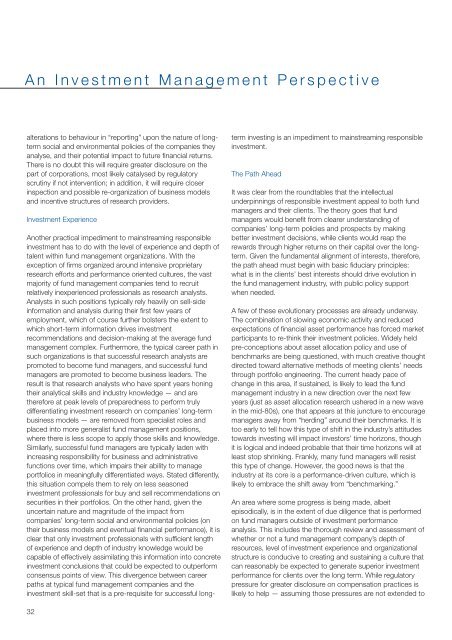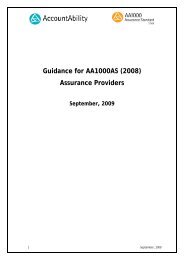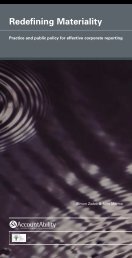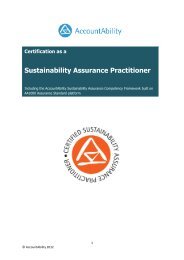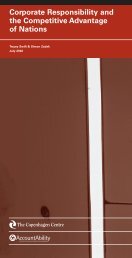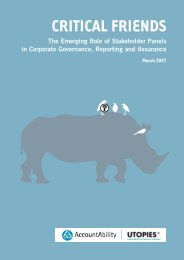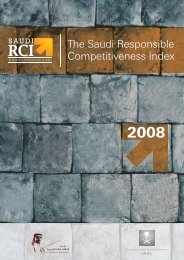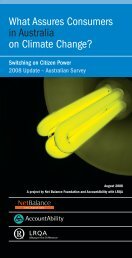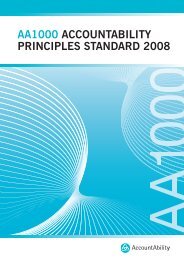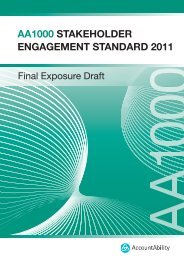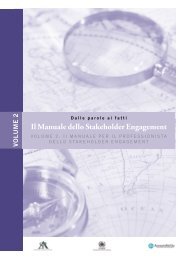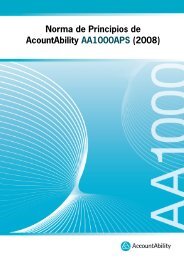Mainstreaming Responsible Investment - AccountAbility
Mainstreaming Responsible Investment - AccountAbility
Mainstreaming Responsible Investment - AccountAbility
You also want an ePaper? Increase the reach of your titles
YUMPU automatically turns print PDFs into web optimized ePapers that Google loves.
An <strong>Investment</strong> Management Perspective<br />
alterations to behaviour in “reporting” upon the nature of longterm<br />
social and environmental policies of the companies they<br />
analyse, and their potential impact to future financial returns.<br />
There is no doubt this will require greater disclosure on the<br />
part of corporations, most likely catalysed by regulatory<br />
scrutiny if not intervention; in addition, it will require closer<br />
inspection and possible re-organization of business models<br />
and incentive structures of research providers.<br />
<strong>Investment</strong> Experience<br />
Another practical impediment to mainstreaming responsible<br />
investment has to do with the level of experience and depth of<br />
talent within fund management organizations. With the<br />
exception of firms organized around intensive proprietary<br />
research efforts and performance oriented cultures, the vast<br />
majority of fund management companies tend to recruit<br />
relatively inexperienced professionals as research analysts.<br />
Analysts in such positions typically rely heavily on sell-side<br />
information and analysis during their first few years of<br />
employment, which of course further bolsters the extent to<br />
which short-term information drives investment<br />
recommendations and decision-making at the average fund<br />
management complex. Furthermore, the typical career path in<br />
such organizations is that successful research analysts are<br />
promoted to become fund managers, and successful fund<br />
managers are promoted to become business leaders. The<br />
result is that research analysts who have spent years honing<br />
their analytical skills and industry knowledge — and are<br />
therefore at peak levels of preparedness to perform truly<br />
differentiating investment research on companies’ long-term<br />
business models — are removed from specialist roles and<br />
placed into more generalist fund management positions,<br />
where there is less scope to apply those skills and knowledge.<br />
Similarly, successful fund managers are typically laden with<br />
increasing responsibility for business and administrative<br />
functions over time, which impairs their ability to manage<br />
portfolios in meaningfully differentiated ways. Stated differently,<br />
this situation compels them to rely on less seasoned<br />
investment professionals for buy and sell recommendations on<br />
securities in their portfolios. On the other hand, given the<br />
uncertain nature and magnitude of the impact from<br />
companies’ long-term social and environmental policies (on<br />
their business models and eventual financial performance), it is<br />
clear that only investment professionals with sufficient length<br />
of experience and depth of industry knowledge would be<br />
capable of effectively assimilating this information into concrete<br />
investment conclusions that could be expected to outperform<br />
consensus points of view. This divergence between career<br />
paths at typical fund management companies and the<br />
investment skill-set that is a pre-requisite for successful longterm<br />
investing is an impediment to mainstreaming responsible<br />
investment.<br />
The Path Ahead<br />
It was clear from the roundtables that the intellectual<br />
underpinnings of responsible investment appeal to both fund<br />
managers and their clients. The theory goes that fund<br />
managers would benefit from clearer understanding of<br />
companies’ long-term policies and prospects by making<br />
better investment decisions, while clients would reap the<br />
rewards through higher returns on their capital over the longterm.<br />
Given the fundamental alignment of interests, therefore,<br />
the path ahead must begin with basic fiduciary principles:<br />
what is in the clients’ best interests should drive evolution in<br />
the fund management industry, with public policy support<br />
when needed.<br />
A few of these evolutionary processes are already underway.<br />
The combination of slowing economic activity and reduced<br />
expectations of financial asset performance has forced market<br />
participants to re-think their investment policies. Widely held<br />
pre-conceptions about asset allocation policy and use of<br />
benchmarks are being questioned, with much creative thought<br />
directed toward alternative methods of meeting clients’ needs<br />
through portfolio engineering. The current heady pace of<br />
change in this area, if sustained, is likely to lead the fund<br />
management industry in a new direction over the next few<br />
years (just as asset allocation research ushered in a new wave<br />
in the mid-80s), one that appears at this juncture to encourage<br />
managers away from “herding” around their benchmarks. It is<br />
too early to tell how this type of shift in the industry’s attitudes<br />
towards investing will impact investors’ time horizons, though<br />
it is logical and indeed probable that their time horizons will at<br />
least stop shrinking. Frankly, many fund managers will resist<br />
this type of change. However, the good news is that the<br />
industry at its core is a performance-driven culture, which is<br />
likely to embrace the shift away from “benchmarking.”<br />
An area where some progress is being made, albeit<br />
episodically, is in the extent of due diligence that is performed<br />
on fund managers outside of investment performance<br />
analysis. This includes the thorough review and assessment of<br />
whether or not a fund management company’s depth of<br />
resources, level of investment experience and organizational<br />
structure is conducive to creating and sustaining a culture that<br />
can reasonably be expected to generate superior investment<br />
performance for clients over the long term. While regulatory<br />
pressure for greater disclosure on compensation practices is<br />
likely to help — assuming those pressures are not extended to<br />
32


